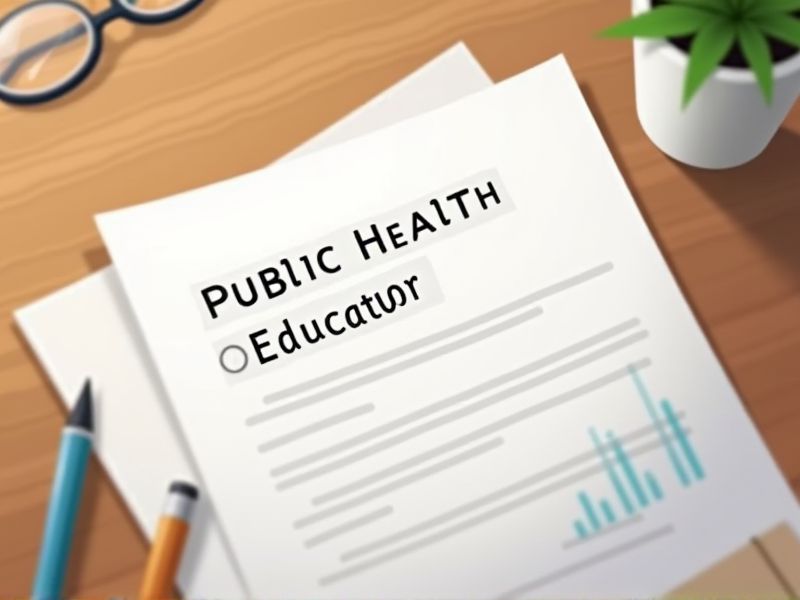
Public health educators often require specific certifications to ensure they possess the necessary skills and knowledge to effectively disseminate critical health information. These certifications validate expertise in areas such as epidemiology, community health initiatives, and health program planning. Employers and organizations trust certified professionals to implement evidence-based strategies for improving community health outcomes. Key certifications for public health educators can elevate their impact and career prospects.
Certified Health Education Specialist (CHES)
The Certified Health Education Specialist (CHES) credential enhances a public health educator's credibility by validating their expertise and knowledge in health education principles. Employers often seek CHES-certified individuals due to their proven capability to effectively design, implement, and evaluate health programs. The certification ensures that educators are current with evolving public health trends and practices, leading to improved health outcomes. Professional recognition from CHES status can lead to more career advancement opportunities and higher job satisfaction.
Master Certified Health Education Specialist (MCHES)
Public health challenges are becoming increasingly complex, requiring health educators with advanced and specialized knowledge to effectively address these issues. Having MCHES certification equips professionals with validated expertise in advanced-level competencies and leadership skills crucial for the development and implementation of effective health education strategies. This certification ensures that specialists can critically assess health education needs and design interventions based on data and evidence. Hiring MCHES professionals fosters trust and reliability in public health interventions, ensuring communities receive sound and impactful health education.
Certified in Public Health (CPH)
Obtaining the Certified in Public Health (CPH) designation enhances the educator's competency in delivering evidence-based public health knowledge. It establishes a standardized benchmark, ensuring educators meet national professional standards in public health. Through certification, public health educators are more likely to stay updated with the latest guidelines and research developments. Employers often prefer certified professionals, which can increase job opportunities and career advancement in the field.
Certified Tobacco Treatment Specialist (CTTS)
The role of a Certified Tobacco Treatment Specialist (CTTS) enhances the effectiveness of public health educators by equipping them with specialized knowledge to address tobacco addiction more comprehensively. Tobacco use remains a leading cause of preventable disease and death, necessitating targeted interventions that CTTS can provide. Public health educators with CTTS credentials can design and implement evidence-based cessation programs tailored to diverse communities. Their expertise in behavioral change strategies ensures more successful outcomes in reducing tobacco dependency.
Certified Diabetes Educator (CDE)
Certified Diabetes Educators (CDEs) provide expert guidance on diabetes management, enhancing the efficacy of public health education programs by delivering specialized knowledge. Their involvement leads to improved patient outcomes, especially in communities with high diabetes prevalence, by tailoring education to meet specific needs. Collaborating with public health educators, CDEs integrate evidence-based practices into community health initiatives, fostering better prevention and management strategies. The nuanced expertise of CDEs helps mitigate healthcare costs associated with diabetes complications, easing the overall public health burden.
Certified Community Health Worker (CCHW)
Certified Community Health Workers (CCHWs) often bridge cultural and linguistic gaps between healthcare providers and communities, enhancing the effectiveness of public health education. Their understanding of local health needs and societal influences allows them to tailor health promotion strategies that resonate with community members. CCHWs can act as trusted figures, increasing community engagement and adherence to public health interventions. By leveraging their unique position, CCHWs can gather valuable insights on community-specific health challenges, guiding the development of more relevant educational programs.
Public Health Informatics Certification (PHIC)
Public Health Informatics Certification equips educators with the skills to efficiently manage and analyze health data, enhancing decision-making processes. This certification ensures educators remain adept at using evolving technology platforms crucial for effective health communication. It fosters a comprehensive understanding of data-driven strategies, enabling educators to address public health challenges more effectively. Equipped with PHIC, educators can advocate for and implement evidence-based practices, which directly improves community health outcomes.
Certified Wellness Practitioner (CWP)
Public health educators require updated approaches to effectively address diverse population needs; possessing a CWP credential equips them with evidence-based strategies focused on holistic well-being. Rising health disparities necessitate educators who can advocate for comprehensive wellness initiatives, aligning with the competencies that a Certified Wellness Practitioner brings. A CWP offers specialized expertise in behavior change and health promotion, which is crucial for developing impactful educational programs. Health systems increasingly value multidisciplinary skills, and a CWP credential signifies advanced training, enhancing an educator's credibility and ability to lead wellness efforts.
Certified Emergency Preparedness Professional (CEPP)
Certified Emergency Preparedness Professionals (CEPP) enhance the ability of public health educators to effectively plan and respond to emergencies, reducing risks to community health. Expertise in emergency preparedness leads to more informed educational programs, ensuring that communities receive crucial information when crises occur. CEPP training equips public health educators with skills to coordinate with emergency services and strengthen local resilience. Certification underscores a commitment to public safety, instilling greater public trust and ensuring adherence to best practices during emergencies.
Project Management Professional (PMP)
Obtaining a Project Management Professional (PMP) certification equips a public health educator with structured project management skills, essential for efficiently coordinating health initiatives. Managing complex public health projects requires balancing resources, timelines, and objectives, which PMP training effectively addresses. Establishing accountability and enhancing communication among multidisciplinary teams are benefits fostered by PMP methodologies. Improved project delivery and stakeholder satisfaction in public health education result from the strategic planning and risk management skills acquired through PMP certification.
Summary
When you obtain certifications as a Public Health Educator, your expertise becomes more recognized, leading to increased trust from both communities and employers. Enhanced credibility often translates into better job opportunities and potential for career advancement. Certified educators typically have greater access to a network of professionals, fostering collaborative opportunities and resource sharing. You may also experience improved effectiveness in health program implementation, directly impacting community health outcomes.
